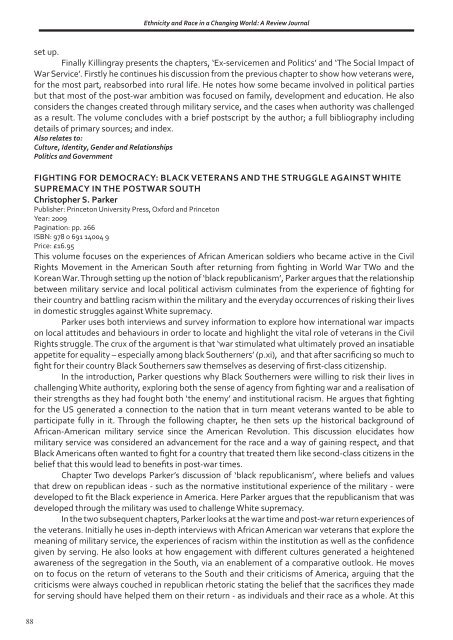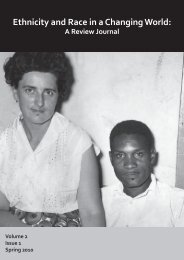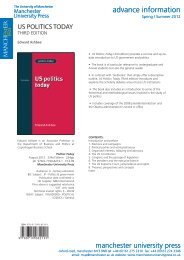Ethnicity and Race in a Changing World
Volume 2, Issue 1, 2011 - Manchester University Press
Volume 2, Issue 1, 2011 - Manchester University Press
Create successful ePaper yourself
Turn your PDF publications into a flip-book with our unique Google optimized e-Paper software.
<strong>Ethnicity</strong> <strong>and</strong> <strong>Race</strong> <strong>in</strong> a Chang<strong>in</strong>g <strong>World</strong>: A Review Journalset up.F<strong>in</strong>ally Kill<strong>in</strong>gray presents the chapters, ‘Ex-servicemen <strong>and</strong> Politics’ <strong>and</strong> ‘The Social Impact ofWar Service’. Firstly he cont<strong>in</strong>ues his discussion from the previous chapter to show how veterans were,for the most part, reabsorbed <strong>in</strong>to rural life. He notes how some became <strong>in</strong>volved <strong>in</strong> political partiesbut that most of the post-war ambition was focused on family, development <strong>and</strong> education. He alsoconsiders the changes created through military service, <strong>and</strong> the cases when authority was challengedas a result. The volume concludes with a brief postscript by the author; a full bibliography <strong>in</strong>clud<strong>in</strong>gdetails of primary sources; <strong>and</strong> <strong>in</strong>dex.Also relates to:Culture, Identity, Gender <strong>and</strong> RelationshipsPolitics <strong>and</strong> GovernmentFIGHTING FOR DEMOCRACY: BLACK VETERANS AND THE STRUGGLE AGAINST WHITESUPREMACY IN THE POSTWAR SOUTHChristopher S. ParkerPublisher: Pr<strong>in</strong>ceton University Press, Oxford <strong>and</strong> Pr<strong>in</strong>cetonYear: 2009Pag<strong>in</strong>ation: pp. 266ISBN: 978 0 691 14004 9Price: £16.95This volume focuses on the experiences of African American soldiers who became active <strong>in</strong> the CivilRights Movement <strong>in</strong> the American South after return<strong>in</strong>g from fight<strong>in</strong>g <strong>in</strong> <strong>World</strong> War TWo <strong>and</strong> theKorean War. Through sett<strong>in</strong>g up the notion of ‘black republicanism’, Parker argues that the relationshipbetween military service <strong>and</strong> local political activism culm<strong>in</strong>ates from the experience of fight<strong>in</strong>g fortheir country <strong>and</strong> battl<strong>in</strong>g racism with<strong>in</strong> the military <strong>and</strong> the everyday occurrences of risk<strong>in</strong>g their lives<strong>in</strong> domestic struggles aga<strong>in</strong>st White supremacy.Parker uses both <strong>in</strong>terviews <strong>and</strong> survey <strong>in</strong>formation to explore how <strong>in</strong>ternational war impactson local attitudes <strong>and</strong> behaviours <strong>in</strong> order to locate <strong>and</strong> highlight the vital role of veterans <strong>in</strong> the CivilRights struggle. The crux of the argument is that ‘war stimulated what ultimately proved an <strong>in</strong>satiableappetite for equality – especially among black Southerners’ (p.xi), <strong>and</strong> that after sacrific<strong>in</strong>g so much tofight for their country Black Southerners saw themselves as deserv<strong>in</strong>g of first-class citizenship.In the <strong>in</strong>troduction, Parker questions why Black Southerners were will<strong>in</strong>g to risk their lives <strong>in</strong>challeng<strong>in</strong>g White authority, explor<strong>in</strong>g both the sense of agency from fight<strong>in</strong>g war <strong>and</strong> a realisation oftheir strengths as they had fought both ‘the enemy’ <strong>and</strong> <strong>in</strong>stitutional racism. He argues that fight<strong>in</strong>gfor the US generated a connection to the nation that <strong>in</strong> turn meant veterans wanted to be able toparticipate fully <strong>in</strong> it. Through the follow<strong>in</strong>g chapter, he then sets up the historical background ofAfrican-American military service s<strong>in</strong>ce the American Revolution. This discussion elucidates howmilitary service was considered an advancement for the race <strong>and</strong> a way of ga<strong>in</strong><strong>in</strong>g respect, <strong>and</strong> thatBlack Americans often wanted to fight for a country that treated them like second-class citizens <strong>in</strong> thebelief that this would lead to benefits <strong>in</strong> post-war times.Chapter Two develops Parker’s discussion of ‘black republicanism’, where beliefs <strong>and</strong> valuesthat drew on republican ideas - such as the normative <strong>in</strong>stitutional experience of the military - weredeveloped to fit the Black experience <strong>in</strong> America. Here Parker argues that the republicanism that wasdeveloped through the military was used to challenge White supremacy.In the two subsequent chapters, Parker looks at the war time <strong>and</strong> post-war return experiences ofthe veterans. Initially he uses <strong>in</strong>-depth <strong>in</strong>terviews with African American war veterans that explore themean<strong>in</strong>g of military service, the experiences of racism with<strong>in</strong> the <strong>in</strong>stitution as well as the confidencegiven by serv<strong>in</strong>g. He also looks at how engagement with different cultures generated a heightenedawareness of the segregation <strong>in</strong> the South, via an enablement of a comparative outlook. He moveson to focus on the return of veterans to the South <strong>and</strong> their criticisms of America, argu<strong>in</strong>g that thecriticisms were always couched <strong>in</strong> republican rhetoric stat<strong>in</strong>g the belief that the sacrifices they madefor serv<strong>in</strong>g should have helped them on their return - as <strong>in</strong>dividuals <strong>and</strong> their race as a whole. At this88






